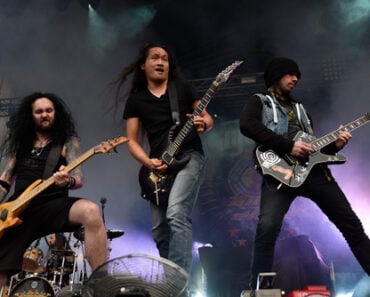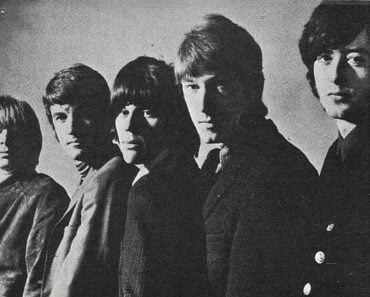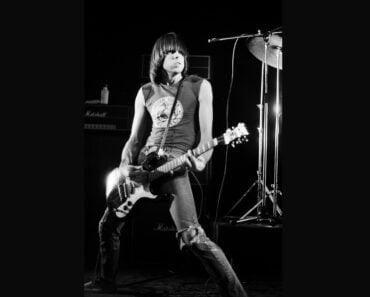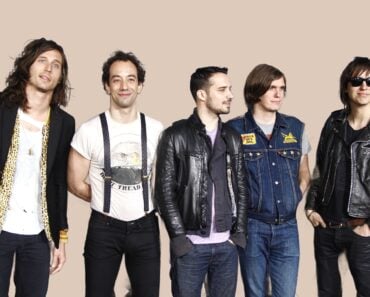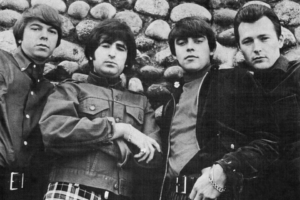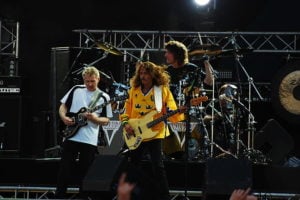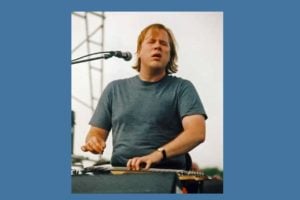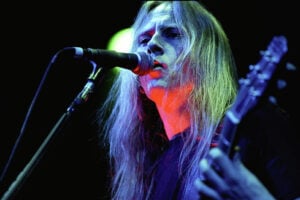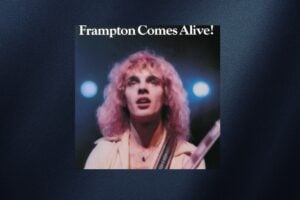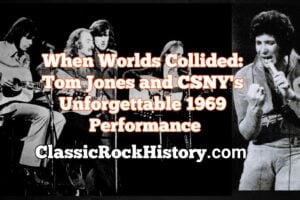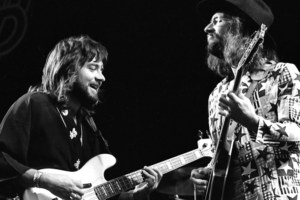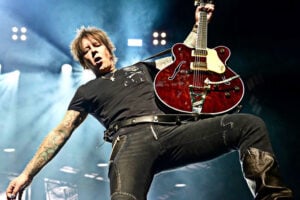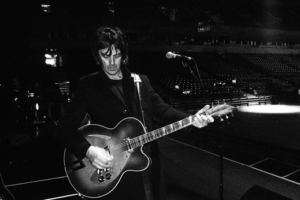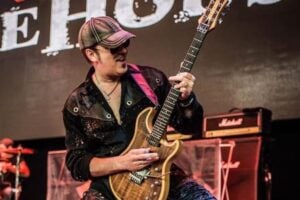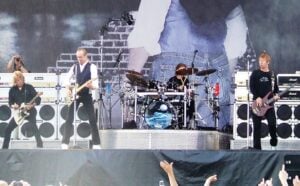
Feature Photo: Quolion at the Dutch language Wikipedia, CC BY-SA 3.0 <http://creativecommons.org/licenses/by-sa/3.0/>, via Wikimedia Commons
Born from the teenage ambitions of two South London schoolmates, Status Quo emerged from humble beginnings to become one of Britain’s most enduring rock institutions. The band originated as The Paladins in 1962 at Sedgehill Comprehensive School, Catford, when schoolboys Francis Rossi and Alan Lancaster joined forces with classmates Jess Jaworski on keyboards and Alan Key on drums. Over their remarkable 63-year career, Status Quo have released over 100 singles and spent over 500 weeks in the UK Albums Chart, making them one of the most successful bands of all time in the UK. The band has achieved over 60 chart hits in the UK, more than any other rock band, with 22 of these reaching the Top 10.
Status Quo received a Brit Award for Outstanding Contribution to Music in 1991, and their performance opening Live Aid at Wembley Stadium in 1985 with “Rockin’ All Over the World” remains one of their most iconic moments. By 2012, they were recognized as the tenth best-selling group in UK Singles Chart history with 7.2 million singles sales in their homeland alone. The band has undergone numerous lineup changes throughout their history, evolving from a psychedelic pop group in the late 1960s to the hard rock boogie sound that would define their legacy.
Status Quo have released 33 studio albums, with 25 UK top ten albums to their credit, extending from their breakthrough with Piledriver in 1972 all the way to their most recent release, Backbone, in 2019. The band has performed over 6,000 concerts to an audience exceeding 25 million people, traveling four million miles over 48 years of touring activity. Despite deaths, departures, and decades of changing musical landscapes, Status Quo continues to tour and record, testament to their enduring appeal and the strength of their distinctive boogie rock sound.
Original Lineup Members
Francis Rossi
Francis Dominic Nicholas Michael Rossi was born on 29 May 1949 in Forest Hill, London, to an Italian ice cream merchant father and a Northern Irish Roman Catholic mother from Liverpool. Rossi co-founded Status Quo in 1962 as The Paladins while attending Sedgehill Comprehensive School, initially alongside bassist Alan Lancaster, keyboardist Jess Jaworski, and drummer Alan Key. He has remained the band’s sole continuous member throughout their entire 63-year history, serving as lead guitarist, primary songwriter, and frontman. Known within the band as “Frame” or “The Gomor” (The Grand Old Man of Rock), Rossi was initially credited as Mike Rossi on early albums up to 1971’s Dog of Two Head, as his manager deemed his real name “too poncey.”
Rossi’s contributions to Status Quo extend far beyond his role as guitarist and vocalist. He has co-written many of the band’s biggest hits and has been instrumental in shaping their distinctive sound throughout multiple decades. His guitar of choice is the Fender Telecaster, particularly his trademark green 1957 model with a maple fretboard, which he purchased in 1968 and was originally sunburst before being painted green in 1970. Throughout the band’s golden period of the 1970s, Rossi’s partnership with Rick Parfitt created one of rock’s most recognizable dual-guitar sounds, with their synchronized “heads down, legs apart” stance becoming iconic.
Outside Status Quo, Rossi has pursued various solo projects. In 1985, when the band was on hold, he recorded two singles with his longtime writing partner Bernie Frost. In 2019, he released a joint album with UK singer and violinist Hannah Rickard entitled “We Talk Too Much,” and also published his autobiography “I Talk Too Much.” He starred alongside Rick Parfitt in the 2013 adventure comedy film “Bula Quo!” and received an OBE in 2010 for services to music and charity. Rossi continues to lead Status Quo into their seventh decade, proving his remarkable longevity and dedication to the band he helped create as a teenager.
Alan Lancaster
Alan Lancaster co-founded Status Quo alongside Francis Rossi in 1962 while they were classmates at Sedgehill Comprehensive School. As the band’s original bassist and co-lead vocalist, Lancaster was instrumental in developing their early sound and remained with the group for 23 years until 1985. During his tenure, Lancaster played on fourteen studio albums and contributed to many of their biggest hits, including their only UK number one single “Down Down” in 1975. His bass playing and vocals were essential components of the classic “Frantic Four” lineup that defined Status Quo’s most successful period during the 1970s.
Lancaster’s relationship with the band became increasingly strained during the early 1980s due to personal and musical differences. The specific dispute concerned two tracks that became hits for the group, particularly “Ol’ Rag Blues,” which Lancaster had co-written but was angered when producers chose to release a version with Rossi singing the lead vocal instead of himself. By 1983, Lancaster had moved to Australia, and a cardboard cutout sometimes substituted for him during television appearances. In 1985, Lancaster took out a legal injunction to stop the band using the Status Quo name, but an out-of-court settlement was reached in January 1986, giving Rossi and Parfitt the rights to continue.
After leaving Status Quo, Lancaster settled in Australia and joined The Party Boys, an Australian supergroup featuring members from Rose Tattoo, The Angels, and other prominent Australian rock acts. However, in 2013 and 2014, Lancaster returned for the highly successful “Frantic Four” reunion tours, reuniting with Rossi, Parfitt, and Coghlan for the first time in over 30 years. These concerts proved hugely popular with fans and demonstrated that despite past differences, the chemistry between the original members remained intact. Alan Lancaster died in 2021, marking the end of an era for Status Quo and their founding members.
Jess Jaworski
Jess Jaworski was one of the four original members of Status Quo, joining Francis Rossi, Alan Lancaster, and Alan Key when the band formed as The Paladins in 1962 at Sedgehill Comprehensive School. As the band’s first keyboardist, Jaworski was present during their earliest performances and helped establish their initial sound during the group’s formative years. According to accounts, the group practiced in Jaworski’s bedroom during their early days, playing covers of popular songs of the era.
Jaworski’s tenure with the band was relatively brief, lasting only three years from 1962 to 1965. When Rossi, Lancaster, and Jaworski finished school in 1965, Jaworski made the decision to leave the band to seek employment outside of the music industry. His departure marked the first significant lineup change for the band, and he was replaced by organist Roy Lynes. Jaworski’s early exit from the group meant he did not participate in Status Quo’s later commercial success, missing out on their transformation from a local school band to international rock stars.
While Jaworski’s contribution to Status Quo was brief, his role in the band’s founding cannot be understated. As one of the original four members, he was part of the core group that would eventually become one of Britain’s most successful rock bands. His departure in 1965 came just three years before the band would achieve their first major breakthrough with “Pictures of Matchstick Men” in 1968, making him one of the few original members who did not experience the band’s rise to fame.
Alan Key
Alan Key was Status Quo’s original drummer when the band formed as The Paladins in 1962 at Sedgehill Comprehensive School. According to Francis Rossi, the formation of the group was actually Key’s idea, and he was instrumental in bringing together the four founding members. As the drummer during the band’s earliest incarnation, Key was present for their initial performances and helped establish their rhythm section during their formative period as a school band.
Key’s time with Status Quo was short-lived, lasting only from 1962 to 1963. In 1963, Key was replaced by John Coghlan, and the band also changed their name from The Paladins to The Spectres. Rossi maintains that Key had left at an earlier time to get married, and was briefly replaced by a drummer named “Tony” before the band settled on Coghlan as their preferred drummer. This change proved to be crucial for the band’s future success, as Coghlan would go on to become one of their most important members.
Key’s departure came six years before Status Quo achieved their first hit with “Pictures of Matchstick Men,” meaning he missed out entirely on the band’s commercial success. His brief tenure makes him one of the least documented members of Status Quo’s history, yet his role in the band’s formation remains significant. As the drummer who helped inspire the creation of the group, Key can be considered one of the founding fathers of what would become one of Britain’s most enduring rock institutions.
The Classic “Frantic Four” Era Members
Rick Parfitt
Richard John Parfitt was born in Westfield, near Woking, on October 12, 1948, to an insurance salesman father and a mother who worked in local cake shops. In 1963, while playing guitar and singing at The Prince of Wales Feathers pub in Camden, London, his father was approached by an agent who offered Parfitt a performing job at Sunshine Holiday Camp on Hayling Island. There he joined Jean and Gloria Harrison to form a cabaret trio called The Highlights, and it was during a subsequent stint at Butlin’s Minehead that he first met Francis Rossi and the members of The Spectres.
Parfitt joined Status Quo in August 1967 at the request of manager Pat Barlow, who suggested the group needed an additional singer. His addition to the band proved transformative, as his rhythm guitar work perfectly complemented Rossi’s lead guitar, creating the distinctive dual-guitar sound that would define Status Quo for nearly five decades. Parfitt wrote songs for the band and remained with them for 49 years, contributing to their evolution from psychedelic pop to hard rock boogie. His stage presence, characterized by his energetic performance style and synchronized movements with Rossi, became legendary among rock fans.
Parfitt’s songwriting contributions were substantial, often collaborating with keyboardist Andy Bown on some of the band’s most memorable tracks. He co-wrote the group’s 1979 hit “Whatever You Want” with Bown, among other well-known Quo songs. In 1985, Parfitt wrote and recorded a solo album called “Recorded Delivery,” but it was never officially released, although some tracks were later reworked as Status Quo B-sides. Following his death in 2016, a posthumous solo album titled “Over and Out” was completed and released in 2018, featuring contributions from Brian May, Chris Wolstenholme of Muse, and current and former Status Quo members.
Throughout his career, Parfitt faced numerous health challenges, including multiple heart attacks and various surgeries. He underwent quadruple bypass surgery in 1997 but made a full recovery and returned to performing. On 28 October 2016, Parfitt permanently retired from live performances after suffering a heart attack earlier that year, and he died in hospital in Marbella, Spain on December 24, 2016, as a result of severe infection following a shoulder injury. Parfitt received an OBE in 2010 alongside Francis Rossi for services to music and charity. His nearly five-decade partnership with Rossi remains one of rock music’s longest and most successful collaborations.
Roy Lynes
Roy Lynes joined Status Quo in 1965 as keyboardist, replacing original member Jess Jaworski when the latter chose to leave the band upon finishing school. Lynes was recruited by the band’s manager Pat Barlow and became part of the lineup during the group’s transition from The Spectres to Traffic Jam and eventually The Status Quo. His keyboards were featured on the band’s early breakthrough recordings, including their first major hit “Pictures of Matchstick Men” in 1968 and the follow-up “Ice in the Sun.”
Lynes remained with Status Quo for five years, from 1965 to 1970, playing on their first three albums: “Picturesque Matchstickable Messages from the Status Quo” (1968), “Spare Parts” (1969), and “Ma Kelly’s Greasy Spoon” (1970). During his tenure, the band evolved from their psychedelic pop phase into the harder rock sound that would define their future success. His keyboard work provided atmospheric textures to their early recordings and helped establish the fuller sound that distinguished them from three-piece rock bands of the era.
Lynes left Status Quo in 1970, with Francis Rossi later stating in his 2019 autobiography that Lynes had decided to get married and that he departed while “on their way to a gig in Aberdeen when he jumped ship somewhere around Stoke-on-Trent.” According to another account, “He just got off the train and that was the last we ever saw of him.” After Lynes’ departure, the band continued as a four-piece without a permanent keyboardist, though they later hired various session players and eventually Andy Bown as an additional musician. Lynes’ departure marked the end of Status Quo’s keyboard-driven era and the beginning of their focus on the dual-guitar sound that would become their trademark.
John Coghlan
John Robert Coghlan was born on 19 September 1946 in Dulwich, South London, to a Glasgow-born father and a London-born half-French mother. He left school at 15 to begin an apprenticeship as a mechanic and received drumming tuition under Lloyd Ryan, who also taught Phil Collins the drum rudiments. Coghlan joined Status Quo (then called The Paladins, later The Spectres) in early 1962 after meeting bassist Alan Lancaster, guitarist Francis Rossi, and keyboard player Jess Jaworski. His addition to the band in 1963 marked the beginning of one of rock’s most enduring rhythm sections.
Coghlan played on the first fourteen Quo albums and was instrumental in developing their distinctive boogie rock sound. His drumming style, characterized by a strong shuffle rhythm and influenced by his jazz background, became fundamental to Status Quo’s identity. During his tenure, the band achieved numerous UK chart hits, including “Paper Plane,” “Caroline,” “Down Down” (their only number one), “Roll Over Lay Down,” “Rain,” “Rockin’ All Over the World,” and many others. “Down Down” topped the UK Singles Chart in January 1975, becoming their only UK number one to date.
While Quo were recording what became their 1+9+8+2 album, Coghlan unexpectedly quit after almost twenty years with the band. According to Francis Rossi and Rick Parfitt, Coghlan “went into the studio, sat behind his kit, ‘tapped around’ on it, ‘then he got up, kicked the whole kit apart, walked out and that was that.'” Coghlan later explained his frustration with the constant touring schedule and personal issues at home, feeling that nobody in the band was interested in anyone else’s problems.
After leaving Status Quo, Coghlan formed several bands and projects. He formed Partners in Crime with singer Noel McCalla, releasing one album called “Organised Crime” in 1985. He also played on a one-off single by The Rockers, a supergroup featuring Roy Wood, Phil Lynott, and Chas Hodges, called “We Are The Boys (Who Make All The Noise).” His own band, John Coghlan’s Diesel, was a loose ensemble that included Bob Young and Andy Bown among others, and he has continued performing with various lineups under the name John Coghlan’s Quo. In 2013 and 2014, Coghlan reunited with the original “Frantic Four” lineup for highly successful reunion tours, playing with Rossi, Parfitt, and Lancaster for the first time since 1981.
Current and Later Members
Andy Bown
Andrew Steven Bown was born on 27 March 1946 and is an English musician specializing in keyboards and bass guitar. Before joining Status Quo, Bown was a member of several notable bands, starting with The Herd alongside Peter Frampton in the 1960s. After The Herd dissolved, he spent two years with Judas Jump, who opened the Isle of Wight Festival in 1970, and later played keyboards and bass for Peter Frampton in the 1970s. Bown left the Frampton organization in 1975, just as Frampton was on the verge of achieving worldwide success, to return to England and begin his association with Status Quo.
Bown first began working with Status Quo as a session musician in 1973, appearing on their “Hello!” album that year and performing on every subsequent album from 1977’s “Rockin’ All Over the World” onwards. He initially worked as an additional musician from 1976, but because he was contracted as a solo artist with EMI, he was not credited as an official member until 1981. In 1982, when drummer John Coghlan left the band, Andy Bown became an official member of Status Quo. His versatility as a musician has made him an integral part of the band’s sound, playing keyboards, rhythm guitar, and harmonica both on stage and in the studio.
Bown’s songwriting contributions to Status Quo have been significant, most notably co-writing their 1979 hit “Whatever You Want” with Rick Parfitt. Bob Young, the band’s chief collaborator and unofficial fifth member, considers Bown to be “the glue that held Status Quo together during some difficult times.” Outside of Status Quo, Bown has maintained a solo career and session work. He released several solo albums, including “Gone to My Head” in 1972 and “Unfinished Business” in 2011. His most well-known solo composition was “Tarot,” the theme tune to the children’s series “Ace of Wands.” With over 37 years with Status Quo and additional work with artists ranging from Dusty Springfield and Tim Hardin to Pink Floyd and Paul McCartney, Bown has never really stopped working since the mid-1960s.
John “Rhino” Edwards
John “Rhino” Edwards joined Status Quo in 1985 as bassist, replacing original member Alan Lancaster. Edwards had previously worked with drummer Jeff Rich on Rick Parfitt’s unreleased solo album “Recorded Delivery,” and both musicians were invited by Parfitt to join Status Quo when the band reformed after the Live Aid concert. The 31-year duration of Edwards’ partnership with the band (not counting drummer changes) makes him one of the most consistent members in Status Quo’s history.
Edwards, along with Parfitt, Bown, and Rich, would release eight studio albums together, starting with “In the Army Now” (1986) and ending with “Famous in the Last Century” (2000), as well as the live album “Live Alive Quo” (1992). During this period, the band saw hits such as “In the Army Now” (1986), “Burning Bridges,” and “The Anniversary Waltz” (1990). Edwards’ bass playing style brought a different dimension to Status Quo compared to original bassist Alan Lancaster, contributing to the band’s evolution while maintaining their distinctive boogie rock sound.
Throughout his nearly four-decade tenure with Status Quo, Edwards has proven himself to be not only a skilled bassist but also a reliable rhythm guitarist and backing vocalist. His contributions extend beyond just performance, as he has been involved in the band’s creative processes and has witnessed their adaptation through changing musical landscapes. Edwards continues to tour and record with Status Quo today, making him one of the longest-serving members in the band’s history after Francis Rossi himself.
Pete Kircher
Pete Kircher joined Status Quo as drummer in 1981, replacing John Coghlan who had dramatically quit the band during recording sessions. Kircher came from the 1960s pop band Honeybus and represented a significant change for Status Quo’s rhythm section. His appointment coincided with Andy Bown becoming an official member of the band, marking the beginning of a new era for the group. This lineup recorded three albums: 1+9+8+2 (1982), Live at the N.E.C. (1982), and Back to Back (1983).
The Kircher era was marked by increasing tensions within the band, particularly between Francis Rossi and the other members. Despite being contracted to record more albums, this lineup played its last full-length gig on 21 July 1984 at the Milton Keynes Bowl. Francis Rossi later recalled this period negatively, stating “Everybody was coked-up and hating each other, and I’d started drinking tequila on that tour. I don’t remember that show at all – the encores or anything; just falling flat on my back at one point.”
Status Quo’s final appearance with the Kircher lineup was their legendary opening performance at the Live Aid charity event at Wembley Stadium in July 1985. This performance revitalized interest in the band and led to their reformation, but Kircher did not continue with the group. When Rossi and Parfitt reformed Status Quo later in 1985 with new musicians, Kircher was not invited back, marking the end of his four-year tenure with the band. His time with Status Quo, though brief and turbulent, included some significant moments in the band’s history, including their Live Aid appearance.
Jeff Rich
Jeff Rich joined Status Quo as drummer in 1985, alongside bassist John “Rhino” Edwards, when the band reformed after their Live Aid appearance. Like Edwards, Rich had previously worked with Rick Parfitt on his unreleased solo album “Recorded Delivery” and was invited to join Status Quo when Parfitt brought both musicians into the reformed band. Rich served as the band’s drummer for 15 years, from 1985 to 2000, making him one of the longest-serving drummers in Status Quo’s history.
During Rich’s tenure, Status Quo released eight studio albums, starting with “In the Army Now” (1986) and continuing through “Famous in the Last Century” (2000). The band achieved significant success during this period, with the “In the Army Now” album and its title track becoming one of their biggest hits, reaching number two in the UK charts. Rich’s drumming style helped maintain the band’s distinctive boogie rock sound while adapting to the changing musical landscape of the 1980s and 1990s. His solid, dependable drumming provided the foundation for the band’s continued commercial success during this era.
In April 2000, Rich retired from Status Quo after 15 years, citing family commitments as the reason for his departure. He was succeeded by Matt Letley, who would continue the band’s drum chair for the next 13 years. Rich’s 15-year tenure represents a significant period in Status Quo’s history, bridging the gap between their classic 1970s era and their continued evolution into the 21st century. His retirement marked the end of one of the band’s most stable and commercially successful lineups.
Matt Letley
Matt Letley joined Status Quo as drummer in 2000, replacing Jeff Rich who had retired after 15 years with the band citing family commitments. With Letley, Status Quo released six studio albums starting with “Heavy Traffic” (2002) and ending with “Bula Quo!” (2013), the latter being a soundtrack album for their feature film of the same name. The band also released a live album, “Pictures – Live at Montreux,” in 2009 during Letley’s tenure.
Letley’s 13-year tenure with Status Quo represented a period of continued creativity and touring for the band. His drumming style maintained the essential boogie rock rhythm that defined Status Quo while bringing his own interpretation to their classic songs. During his time with the band, they continued to tour extensively and remained active in recording new material, proving that Status Quo’s appeal transcended generational changes in their lineup.
In December 2012, Letley announced his decision to leave the band after 12 years, and subsequently departed following completion of their 2012 winter tour. However, Letley continued to tour with Quo for their Australia and Mexico tour in March and April 2013, due to limited time to find a new drummer after the Frantic Four reunion tour. Letley announced his retirement after 13 years in 2013, and was replaced by their current drummer Leon Cave. His departure coincided with a transitional period for the band, as they prepared for both their reunion tours with original members and their continued future with new personnel.
Leon Cave
Leon Cave was born on 24th September 1978 in Northwich, Cheshire, and currently lives in Nantwich with his wife Chloe. Cave is a multi-instrumentalist from Cheshire who has been playing drums since the age of 5. The 34-year-old musician began working at City and Islington College in 2005 as a music technician, preparing students for rehearsals and big events while also allowing learners to shadow him to learn about the technical side of music production and performance.
Cave first played with Francis Rossi in 2010 during his ‘One Step at a Time’ solo project before joining Status Quo as their official drummer in May 2013. Cave had previously performed with several notable artists including the Beautiful South and the Francis Rossi band, as well as Macara, Zen Baseballbat, Texas Chainsaw Orchestra, Hudson Swann, and Carnival Messiah. He plays more than 100 shows each year, including large pop gigs, radio performances, corporate functions, and open air festivals.
Outside of music, Cave is described as a huge Formula One and Tennis fan, as well as enjoying travel and being a self-confessed foodie. He also records and performs with many other artists including Bonnie Tyler, British Blues guitarist Jim Kirkpatrick, and punk/rock band The Middlenight Men. Status Quo describe Cave as “a fast learner of new material with the ability to play across all genres of music.” When he was offered the position with Status Quo, Cave said: “I have really persevered over the years to make it as a musician. Despite my age I never gave up, never lost my passion, and always kept believing that I would be able to be in the position that I am now.”
Richie Malone
Richie Malone was born on 18 March 1986 and is an Irish musician from Ballybrack, South Dublin, who now lives in Firhouse with his wife Jessica and their three daughters. Malone was the frontman of RAID, a rock band based in Dublin, and became a Status Quo fan through his father, first seeing them live in concert in 1999. He was particularly a fan of rhythm guitarist Rick Parfitt, emulating his playing style from a young age and even traveling to England to have a replica of Parfitt’s trademark white 1965 Fender Telecaster made.
Malone first played with Status Quo in July 2016, when Rick Parfitt was no longer able to tour due to a heart attack. He was selected to substitute for Parfitt for gigs in Belgium and Edinburgh in July 2016, before Freddie Edwards (son of bassist John “Rhino” Edwards) took over for some shows. Malone filled in for Parfitt again for concerts in later 2016. After Parfitt died on 24 December 2016, Malone was announced as his permanent replacement.
While not touring with Status Quo, Malone works as a Senior Project Engineer in an Audio/Visual systems integration company where he has been employed for over 10 years. His transition from Status Quo fan to band member represents one of rock music’s most remarkable stories. Malone uses three Telecasters on tour with Status Quo, including a custom-built guitar called the “AC Cobra” and a replica of Rick Parfitt’s white Telecaster that was a birthday present from his father. He has contributed to the band’s recent studio album “Backbone” (2019), co-writing songs including “Get Out Of My Head” and the bonus track “Face The Music,” which showcase his ability to capture the classic Status Quo sound while bringing his own creativity to the band.
Check out more Status Quo articles on ClassicRockHistory.com Just click on any of the links below……
Top 10 Status Quo Songs
Complete List Of Status Quo Studio Albums And Discography
Read More: Artists’ Interviews Directory At ClassicRockHistory.com
Read More: Classic Rock Bands List And Directory


